|
Usually, when referring to an election, the candidate’s promises are the only thing that gets published. In many cases, the media forgets to portray the person within.
In this issue, in preparation for the December 5th elections, the VON presents a series of “intimate” interviews with the five candidates.
Libertarian Movement mayoral candidate
Marvin Vargas Zúñiga: “El Profe” (The Prof) of Nicoya
By Emiliana García
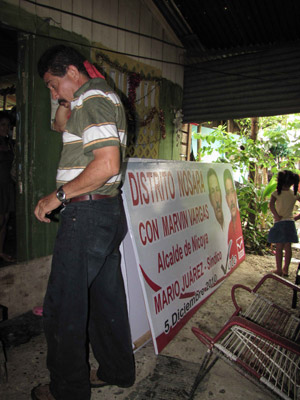 |
|
It was 11 in the morning on October 8 in the city of Nicoya, the Libertarian Movement political party’s club was peaceful and warm. The sun rose in the colonial city, and Marvin Vargas Zúñiga, the mayoral candidate known as “El Profe” (The Professor), looked impeccable behind his red and white desk. He looked up from his cell phone and greeted a visitor: “Good day, young lady, come on in.”
The Nicoya native spoke rapidly and succinctly. He comes from a family of eight brothers. He is married to Maria Ligia Campos, whom he met when he was 19 studying civil engineering at UCR in Liberia, a course he had to abandon because “other brothers came to study and there wasn’t enough for everyone.” Then he started to give classes in math and physics at the night school in Nicoya.
Marvin Vargas in Nosara on October 20th bringing his publicity signs. |
He has had two children and a grandson in the course of 29 years of marriage. Marvin not only gave classes at the night school but also at the daytime Liceo high school; President of the Development Association for the Los Ángeles neighborhood, Treasurer of ANDE (National Association of Educators) and central Director of Banco Popular. With pride, he relates that he was the founder of the school of Los Ángeles, and he traveled around the country 10 times as treasurer. He also inaugurated the Banco Popular building in Nicoya.
Now he aspires to be mayor of the city that he has seen grow and he says he knows what it takes to be mayor: “a strict control.”
EDUCATORS OR THE SYSTEM? “El Profe” answers our questions:
According to the State of Education Reports, the school dropout rate in 2010 increased in comparison with 2009. With your experience as a professor, what do you think could be the cause? “Dropping out of school starts with the educators. Children come to class with social problems and the educator doesn’t pay attention to the symptoms.”
If the educator has an average of 40 students per class, don’t you think it’s difficult to take the time to attend to each one of the students? “This is a reality. When I was in high school, up to 240 students attended, and it’s very difficult to dedicate time to each kid.”
Then is the problem the educators or the system? “It’s the system that’s bad.”
According to Vargas, unemployment is another of the causes of dropping out of school because “the parents don’t find work. Builders hire foreign labor to pay 1000 colones instead of 2000” and he said that to fight unemployment “the Municipality can establish agreements with the universities so they teach them to establish their own business.” He added that inspectors must be trained so they perform better inspections at construction sites and thus avoid labor exploitation.
He openly proclaimed that he’s in favor of developing the maritime land zone (ZMT), which he considers to be “a gold mine,” but doing so “in a controlled manner.” Marvin Vargas said that the problem now is that the municipality “lacks an internal control, a development plan and an entrepreneurial vision.”
The tourism enterprise developers are “welcome” and to solve the problematic social issues of the people that live there, they should “get the development associations more involved.”
And the possible environmental impact on the Maritime Zone? “The municipality and the government have sufficient knowledge and personnel to perform impact studies and to control the development. With the development of the ZMT more funds can be collected to give better services.” Nosara, for example, is now generating income for the Municipality, being the district with the second largest tax contributions. However, the populace says they don’t receive services in return. “The thing is that [the State] budgets very little to the Municipality. The budget of 2 billion [colones] is from 10 years ago [and] we should receive 5 billion.”
Are you in favor of Nosara district becoming independent of Nicoya? “Principally I don’t think so because Nosara is a district that generates money, so the problem with Nosara is that they don’t get the money back in services. More needs to be injected” [in Nosara]. “I pledge to give better municipal services.”
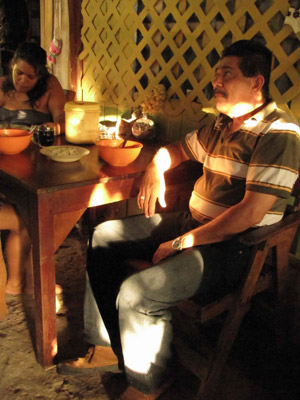 |
|
PRIORITY PROJECTS
• Nicoya Garbage Dump: Coordinate with Nandayure and Hojancha to have one single garbage dump that receives the garbage from the three cantons. Create a recycling program together with a private company so that only what can’t be recycled arrives at the dump.
• Streets: Increase budget and make sure the money is properly invested. According to Vargas, “there are 3 billion colones budgeted exclusively for streets and roads by a loan from Banco Interamericano de Desarollo (Inter-American Development Bank).
• Reformation of the administrative atmosphere of the Municipality
• Rebuild Nicoya’s park |
|
National Liberation Party Candidate
Marco Jiménez Muñoz, “The political philosopher”
By Oliver Pérez, Photos by Emiliana Garcia
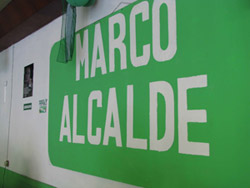
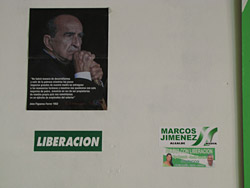
|
|
With the slogan “For a better Nicoya,” Marcos Jiménez Muñoz is one of the hopefuls for the mayor’s seat for the Municipality of Nicoya. Under the shield of “we all vote, we all win,” he hopes to follow the same path as ex-presidents José Figueres Ferrer and Daniel Oduber, who stood out in their duty.
Political by nature and a lover of reading, Marcos Jiménez accepted VON’s desire to discover the man behind the mayoral candidacy for the National Liberation Party (PLN). Our interview took place on a Tuesday at 2 p.m. in his clubhouse. Throughout the conversation, from beginning to end he answered his cell phone and attended to more than one supporter who arrived to consult with him and offer themselves at his disposal.
Married 20 years ago to Margoth Marín Cortés and father of two children — Esteban (15 years old) and Sofía (13), he graduated in Public Relations, Journalism and Political Science from Universidad Latina (Latin University) and Universidad Nacional (National University).
National Liberation Party Headquarters where a poster of ex Liberation Party President José Figueres Ferrer (1952) is proudly displayed.
|
Jimenez is a two-time winner of the National Prize for Rural Journalism, of collegiate oratory in 1979 and university in 1983. He was vice president of the Directive Council of Young People, Undersecretary of Communication for the PLN, Municipal Executive (mayor) 1994-1995, assistant in the Legislative Assembly, radio director, president of the Directive Board of Cultural Radio of Nicoya, and for the past seven years, he has been the secretary of the Municipal Council.
His proposals include reforming the municipal structure, with the objective of making it more efficient and permitting a linkage with the other municipalities of the province. He believes the budget of 2.5 billion colones that the municipality has for 2011 should be used in a way that facilitates the communities carrying out the programs funded by the budget.
The Garbage Problem Jiménez said that “with the purchase made a little while ago of the property for sanitary filling, an error was committed because a property was purchased that was lacking legality; there weren’t viability studies by SETENA.”
Upon becoming mayor, his proposal for an immediate resolution would be “to make an agreement with the municipalities of Santa Cruz and Hojancha.”
He added that “the idea is to buy a treatment plant and have a recycling proposal. This requires $1 million and it would be put into place the second year of his governing.” Jiménez proposes to acquire the money “by means of bank financing.”
And Nicoya cemetery? “The purchasing process has been very slow and there has been a lack of interest in acquiring the property. Up until today, this procedure has been incorrect because it’s not the Council’s responsibility to look for the land. This is a mission of the mayor. The issue is that the money has been there for along time.”
Maritime Land Zone (ZMT) Jimenez trusts that information from the companies contracted to perform the regulatory plans will allow a clear vision of the ZMT. He also expects it to “make us take note of the illegal occupation and undertake the process of vacating” the zone. He added that there’s a weakness on the part of the Costa Rican Tourism Institute because “they still don’t understand about the rectory in this material.”
Nosara and Samara
For this candidate, the district of Nosara is an “international landmark, that the local government would do well to market in the technical world; it would be ecology, life and peace.” He appeared to be in agreement with the possible independence of the district, affirming that “We accept the thesis that the towns should self-govern. Nosara has been a district that has generated a lot for the canton and it’s been repaid very little.”
With regards to Samara, he affirmed that it is “Land of all and land of none, land to live and invest. Marketing has to be done there.” He added that “The ecological flag was lost and there still isn’t awareness of the importance of getting back this prize, which opens a door to more development.”
“A possible solution is to unify the costal cantons, to solve the garbage problem and that this debris doesn’t have to travel long distances.” |
|
BRIEFS
• Pending collection: At this time the municipality has about 800 million colones pending collection. Marcos Jimenez proposes to clean up the system and implement software that improves the management of collection.
• Trucks: With “the normal income (taxes and income from Law 8114), he hopes to improve the road network with BID money. Whenever the budget isn’t enough to execute works, income should be negotiated in trust with the banking system, making investments in strategic areas.”
• The future: “At the start of my administration, we’re going to construct two buildings: one municipal and the other industrial, where we’ll house all the institutions that don’t have their own building. This will cost us $14 million and will be acquired by bank credits.”
|
|
Citizen Action Party (PAC)
Aura Salas, “The woman of conscious decisions”
by Emiliana Garcia
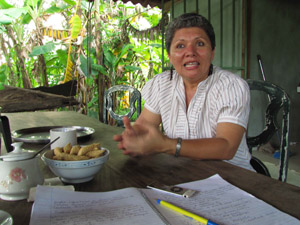
Aura Salas, explianing her plans in her house in San Martin Barrio |
|
“Because I really like community work and attending social problems,” responded Aura Salas, candidate for the Citizen Action Party, when asked why she’s running for the Nicoya mayoralty. In her house in the San Martín neighborhood, she loaded a tray with freshly ground coffee and sesame biscotti. Thus, on a very hot afternoon, we sat down to start the interview.
She said she’s felt a lot of support from people through her facebook account, “with the decision I made, because it’s difficult for a woman to run to mayor, this is a forbidden field and people think that [men] have more ability to make difficult decisions.” |
But Aura Salas has been a social worker in the Nicoya penitentiary system for 23 years, and for 6 years has held the position of director, a position that in itself requires making difficult decisions.
Married with two children, Salas is a petite woman with a motherly look. With a persistent character, she related that, in 1988, she was traveling from Nicoya to Limón every week for nine months to keep her job within the penitentiary system and when she couldn’t make the trips anymore, a position opened in Nicoya. “Why the sacrifice?” I asked. “Because I chose my career conscious that I wanted to do this.”
LACK OF SECURITY
After working in the penitentiary system for 23 years, how do you think you should treat the problem of lack of security? “I believe firmly that a policy of crime prevention is lacking,” she responded, and suggested that, “first we should define what is happening.” Toward this, Salas said that “all of the institutions should work together [and] create an inter-institutional liaison that allows us to define what the solutions are here.”
When asked about what concrete actions she would take if she becomes mayor, she responded that “the solutions can’t come from one person; it would be irresponsible on my part to say ‘I know how to resolve your problem.’ This involves many factors, institutions and people. The municipality can’t set itself up as the owner of truth.”
However, she ventured to suggest as preventive policy, avoiding school dropouts and generating labor options for youths where they’re given scholarships to study. “They have to work also to earn this scholarship” and it should be followed up on “because the majority [of youth] that receive money from the Avancemos program spend it on cellular phones.” She added “In 2010, the municipality earmarked 15 million colones for scholarships, but [the scholarships] were issued arbitrarily.”
How would you extend projects to the outlying towns? “Through the district councils…They should be reactivated! They are the liaison between the community and the municipal structure; they present the projects and ensure that the budgets get assigned [to each district]. Right now they don’t exist, they’re invisible.”
Regarding the problematic Maritime Land Zone, Salas said a two-part solution must be searched for: listen to the people and look for a point of balance between the developers that “have their right and you have to respect it,” and the people who live within the zone because “they acquired rights to be there many years ago.” Salas says that we must always respect the natural resources because “If we don’t take care of them and don’t guarantee the right of the majority to enjoy them, we would be doing wrong.”
And the garbage problem? “I pledge that the property purchased [for the garbage dump] by the municipality won’t be used for this end,” referring to the aquifers that pass underneath the property. “We should be honest and say that we don’t have a solution [to manage the garbage]. We should refer to the experience of other countries where garbage is handled successfully and look for foreign cooperation in training and financing.”
The Canton’s Roads For Salas, the cause of the abominable state of the roads is lack of municipal management. “Look… they budgeted 2.5 billion colones for 2011 and of this money a low percentage is for roadways; the rest goes for the most part to administrative expenses. On the other hand, [this year] the donation of asphalt from Recope to the municipality wasn’t taken advantage of.”
Regarding the jobs already performed, “They’re paying very expensive services with regards to the quality of the service [obtained]. The municipality should ensure that contracts are fulfilled and give better rendering of accounts.”
Independent Nosara: For or Against? Salas responded that she is “In favor of people seeking solutions and forming their petitions,” but she made it clear that “they should analyze it very well, to not make a decision lightly when the damage could be greater than the benefit.”
Would you be willing to sacrifice the income that comes from Nosara to the municipality? “The municipality can’t, for convenience, keep someone by force." |
|
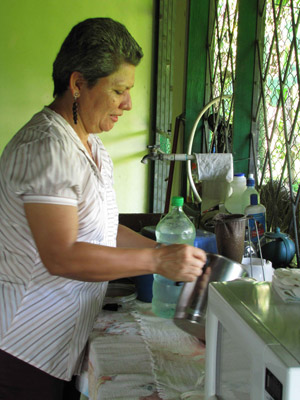
Aura Salas preparing coffee in her house while we prepare for the interview.
And what happens with the garbage dump that is already suspended? “An immediate solution is to ask Santa Cruz and Liberia for an agreement [so they receive the garbage].”
|
| |
|
| |
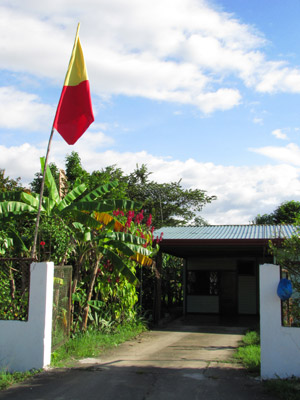
Salas' home in Barrio San Martin is easily recognaizable with the
Pac party flag on prominent display. |
|
Candidate for the Partido Unidad Social Cristiana
Ovidio Jiménez Salazar, “Community Leader”
by Oliver Pérez
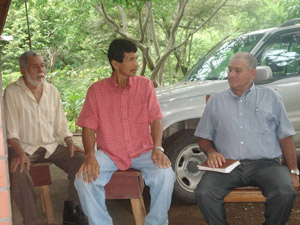
Ovidio Jimenez met with neighbors from Copal, Nicoya, where he shared his mayoral platform and listened to the community petitions. |
|
From parents who also supported the Partido Unidad Social Cristiana (PUSC), Ovidio Jiménez Salazar was born in Belén, Nicoya, the town that watched him grow. 33 years ago he married in Hojancha to María Enar del Carmen Ávila Quirós in Hojancha, with whom he has three children: Lisbeth (33 years old), José Ovidio (26 years old) and José Pablo Ávila Quirós (24 years old).
Throughout his career, he has always occupied community service related positions, such as Town Councilor from 1998 to 2006, Municipal President and Treasurer and Vice President of the Asociación de Desarrollo de Belén for over 20 years. |
This man, who is one of the candidates to occupy the Nicoya Mayor’s office, explained that if he wins the municipal election he will promote a honest administration.
Under the slogan “We Are a Team”, Ovidio Jiménez, a 56-year old stockbreeder, farmer and businessman, has achieved a successful path within the party and was thereby appointed as a candidate. He took on the challenge because he wishes for Nicoya to become an independent area run by hopeful and creative people who think more about their neighbor’s well-being than about their own power. A moderate idealist, he states that he makes difficult decisions, or those that involve a great deal of responsibility, with a steady hand.
This man starts off his day at 5 a.m., taking care of his first task of the morning: milking cows. Two to three times a week he also uses this time to visit his farm in Sabana Grande, Nicoya. However, before 7 a.m., he heads to Belen’s high school, where he is President of the Board of Education.
The VON spoke with him for over two hours during a busy campaign day, where he described his everyday life and what he will do once he occupies the Nicoya Mayor’s chair.
What is your opinion in regards to the area’s road network? “It has been neglected and, during my administration, it will be a priority. We will intervene accordingly and will subsequently follow-up and provide the necessary maintenance. I have an innovative proposal, in which every road must have its own design and a work plan that will be reviewed and approved by each community”.
And what about Nicoya’s cemetery? “We must purchase a two-hectare property that has been ready for a long time, it is located 500 meters away from La Mansion’s crossroads, on the road to Samara. The only funds required will be those needed to set it up”.
The Landfill In regards to the sanitary landfill, Jiménez emphasizes the need to create a new one “with all the necessary conditions”. He explains that his idea is based on “the landfill at Los Mangos, Alajuela; it must be similar, with a lifespan of at least 50 years. For this project funding provided by the Fundación para el Desarrollo Local y el Fortalecimiento Municipal e Institucional de Centroamérica y el Caribe (FUNDEMUCA), where I have several contacts who support this project, must be used”.
Regarding the social issues related to the Maritime Terrestrial Zone, he believes that “zoning plans must be implemented throughout the coastal areas. We must do the necessary follow-up and wait for the results from the companies conducting the investigations. Our goal is to encourage investment in the area by minimizing bureaucratic requirements and procedures. We must activate the Maritime Terrestrial Zone office and speed up concession-related issues”.
Construction Development Jiménez explains that, due to the lack of control, “endorsed construction blueprints must be strictly supervised and, in addition, the construction process must also be supervised from beginning to end. We have the necessary staff to carry out this task, but we are lacking in the planning and follow-up part of the process”.
Nosara and Samara “In Nosara planning has not been a focal point”, he explains, mentioning that he is currently conducting a study in order to build a sanitary landfill.
Among the projects for this district, he plans on establishing “a second access road in Nosara, which would cross through Santa Teresita, Barrio Los Ángeles, Pilas Blancas and all the way to Caimitalito. There are private companies who are willing to take on the costs of this project and therefore, the Municipalidad would be in charge of granting the required permits”.
Regarding education, Jiménez is convinced that the infrastructure of the Bocas de Nosara high school must be improved, in addition to building a sports field in Los Arenales.
He regrets that Samara lost the Blue Ecologic Flag award, which “greatly affected the area’s development rate”. In this case, the most important thing is to “build a sanitary sewer system with an oxidation plant”.
Generally speaking, Jiménez mentioned that in coastal areas “employment opportunities, which in many cases are underpaid, have been taken over by foreigners. In order to regulate the entrance of illegal immigrants, we must establish an Immigration office for these two districts”.
Security In terms of security, this candidate is betting on technological advances and security cameras. “I have several contacts and the Municipalidad will not have to cover the cost. This will be a priority during the first year of our administration. As income is generated from the camera service it will be reinvested in additional security measures, creating a feeling of safety and confidence in both Costa Ricans and foreigners who will come and invest in the area, thereby creating new jobs and a better quality of life”.
Finally, Jiménez insists on providing greater support for the EBAIS, “so that each of them has its own pharmacy and good working conditions”, and the Asadas “in order to guarantee that drinking water is safe for human consumption”.
|
Candidate for the Partido Accesibilidad Sin Exclusión
José Manuel Cabalceta Matarrita: “The Medical Record's Guardian"
by Oliver Pérez
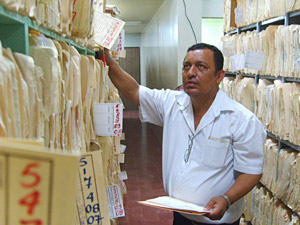
On a Friday afternoon, Jose Manuel Cabalceta reviews the Nicoya Hospital files. Although the temperature can be very high, the room where Cabalceta has his office is big and comfortable. |
|
Representing a party that stands for disabled people's rights in the country, the staff member and Chief of the Clinical Archive at La Anexión Hospital does not consider himself a politician. But José Manuel Cabalceta Matarrita has entered politics under the banner of the Partido Accesibilidad Sin Exclusión (PASE). He hopes to change the way Nicoya and the surrounding areas are governed by being part of an innovative political force that he believes has grown stronger during these past eight years that the Partido Liberación Nacional has been in office.
José Manuel, who recently turned fifty and holds a Master's degree in Healthcare Administration (MHA), has been married for 17 years to Sheiris María Orias Anchía, with whom he has three children: José Alonso (14 year old), Daniel Ernesto (10 year old) and Jaelyn (30). |
He splits his time between family and work, often going to bed by midnight and waking up at 5:30 a.m. He is responsible for guarding thousands of medical records at La Anexión Hospital, where he has worked for 30 years.
In his opinion, Nicoya has experienced a setback in its progress. The trash problem continues to be unsolved, the roads are in bad condition and crime rates have increased, among other issues. "We wish to step away from the traditional solutions, which have not benefited the area at all. We are offering a different choice." Cabalceta explains that the newly-formed party he represents is an honest group whose actions have not been questioned.
VON met with him at Curime, Nicoya, while he went door-to-door asking for support for himself and his proposal, which is focused on Nicoya's equitable development:
Development, progress and new employment opportunities; Improving the area's road network; Accessibility for all people, as is stipulated by Law 7600; Reinvestment of taxes for the community's benefit; and the construction of a new sanitary landfill and cemetery.
In regard to Nicoya's dump, which collapsed and has been closed down, Cabalceta suggests "looking for a property and educating people about recycling, which will benefit the environment and create new jobs. We must find a solution to this problem by building a sanitary landfill with all the necessary conditions."
What about the road network? “We must involve all public entities so they can work together for the area. The Municipalidad has the resources to offer a better quality of life to its residents through improvements in the roads, but this can only be done with teamwork in each community. We must get them involved”.
On the other hand, in regard to Nicoya's cemetery, the lack of interest is the main cause for its state of abandonment. "The cemetery collapsed over 20 years ago and there is still no solution. One of my projects is to look for a property that will serve as a definite solution. The resources are there, but it has not been given the proper attention”.
Construction, coastal towns and the Maritime Terrestrial Zone According to Cabalceta, construction in the area is “an important priority, (because) it has been left unsupervised. The proliferation of illegal buildings is a source of concern for the Colegio de Ingenieros y Arquitectos."
In Nosara's case, the PASE's candidate mentioned that “it is a developing area that is not rewarded for the income it generates. It is a district that gives a lot to the area and this is not returned in improvements. Investment must be encouraged."
Investments must also be encouraged in Samara, where the “ecology flag was lost. We will do whatever needs to be done to recover it. We will go through all the details and see where we've failed".
The problem with the Maritime Terrestrial Zone is the lack of organization. Therefore, that “office should be reactivated”, giving priority to those cases that have been left unsolved for several years. "We must work on the zoning plans and recover the public zone”.
|
 |
| |
More Regional News
Nicoya Mayor Elections UNED Debate
Candidates expounded proposals and put aside attacks
The plans to solve the problems of garbage, the cemetery and roadway improvements for the canton were the most interesting themes in the debate where all of the candidates promised honest and transparent management. More >
Dengue Mosquitoes Active in Samara and Nicoya
Ministerio de Salud says increase in cases is due to lack of prevention at home
Dr. Oscar Mendez Campos, coordinator of Dengue for the Hospital de la Anexion in Nicoya, confirmed that there have been cases of dengue this year both in Nicoya and Samara, but he hasn’t seen any cases from Nosara so far. Though there haven’t been any deaths from dengue in the area this year, there have been few cases of hemorrhagic fever, the more severe form of dengue, in Nicoya. More >
Travel Between Nosara and Samara to be
Fully Restored
Decentralization Minister: Main bridges will be
ready by Wednesday
Since Monday, machinery and workers from the Ministry of Public Works (MOPT) have been working to restore the land connection between Puerto Carrillo and Samara. Last Wednesday, the Bailey bridge between these two communities collapsed. More >
Nosara Slowly Returns to Normal but Ostional Remains Cut Off
- Marbella's bridge remains closed due to damages, cutting off San Juanillo
- If good weather conditions continue, vehicle access over Río Frío might be restored
Although Rio Rosario is now low enough to be crossed, the mud that has piled up on its sides does not allow any vehicles to go through. Rolf Sommer, owner of Luna Azul Hotel, along with other entrepreneurs from San Juanillo, have organized themselves in order to hire a backhoe to rehabilitate the road. More + Video >
Nosara, Ostional and Puerto Carrillo Isolated
Due to heavy rains that started on Monday November 1, these three communities are isolated. In Nosara, the bridge over river Frio collapsed this Wednesday. In Ostional, the Rosario River has being flooded since Monday, and the bridge that communicates the Torito community with Puerto Carrillo collapsed on Thursday. More >
Providing food, medicine and gasoline
People in Nosara are stocking up on food and gasoline for the coming days in anticipation of a possible failure of the delivery of these products. VON communicated with the supermarkets in the area and everyone agrees that there has been an increase in purchases during the past two days. More >
Nicoya – Audit Report of the Maritime Terrestrial Zone
Mel Gibson Purchased Illegally Registered Property
• Due to the absence of a zoning plan, the concession was wrongfully granted
• Municipalidad must take over the beachfront strip in the Maritime Terrestrial Zone
Unfortunately, Mel Gibson’s troubles don’t end, even when he arrives in Costa Rica. Although he is trying to maintain a low profile while recovering from the recent scandals in which he has repeatedly threatened his ex-girlfriend and mother of his youngest child, documents from an internal audit done by Nicoya’s Municipalidad show that part of the property Gibson bought at Playa Barrigona was illegally registered. More >
How “Pura” is the “Vida” of Nosareños?: The Two Faces of Nosara
The effects of the global crisis on Nosara can be applied to an in-depth analysis of the area’s development. Many Nosareños, as did thousands of Guanacastecos, were forced to rapidly adapt to changes in both the job market as well as their lifestyle. The spotlight shifted from agriculture to tourism and the construction industry, which depend largely on foreign investment and where the well-paid jobs are few. More >
|
 |
|
|

